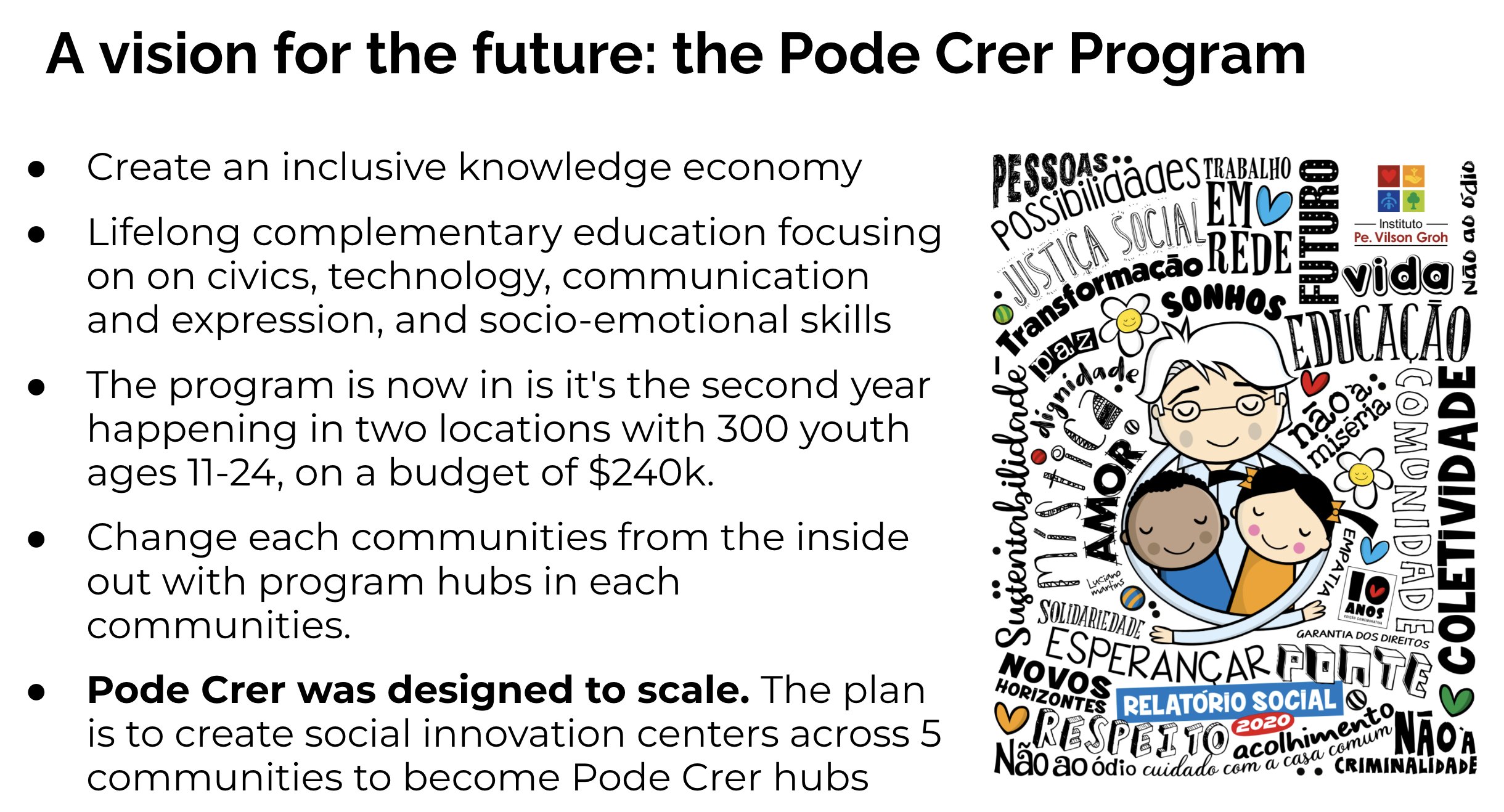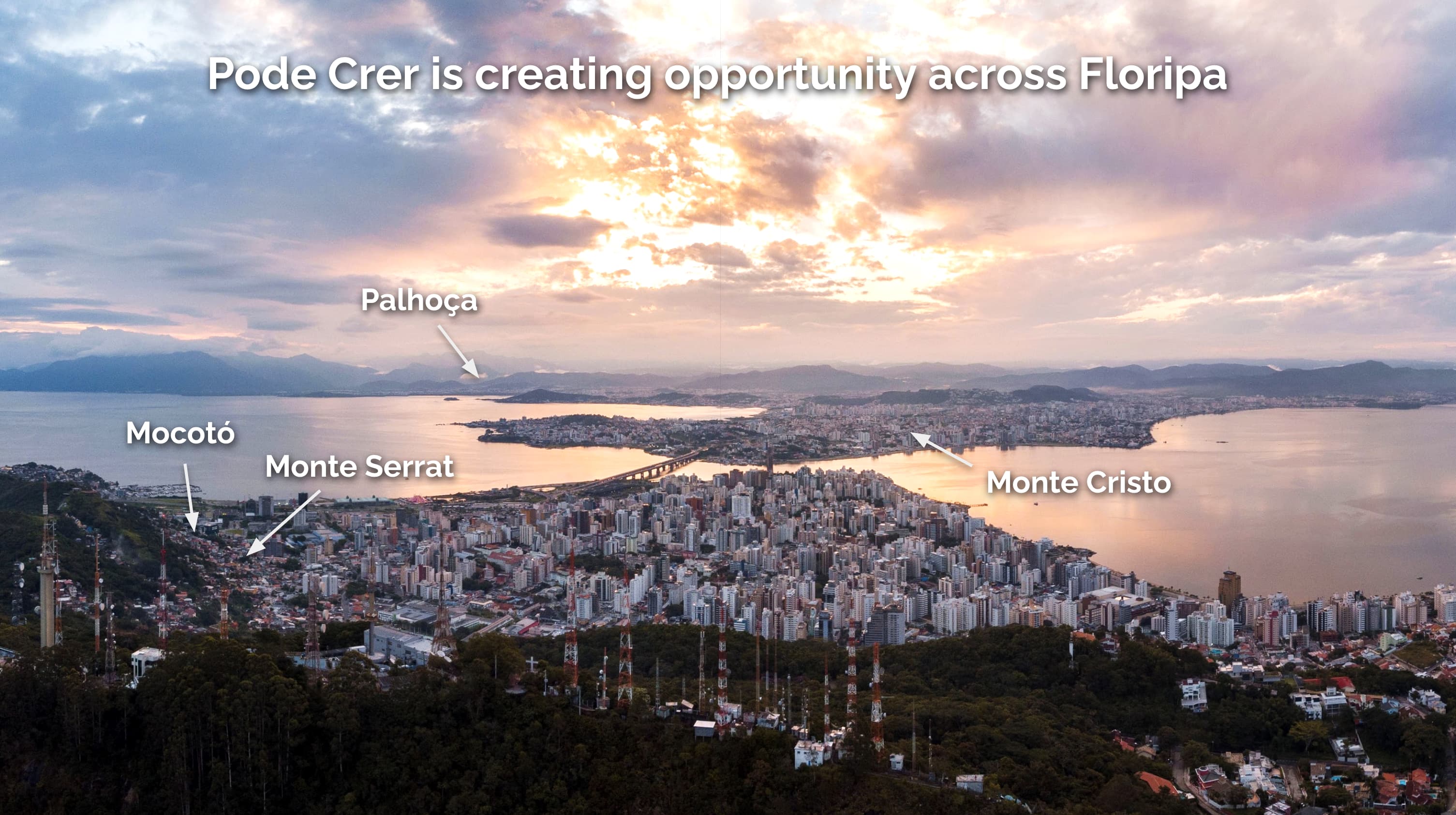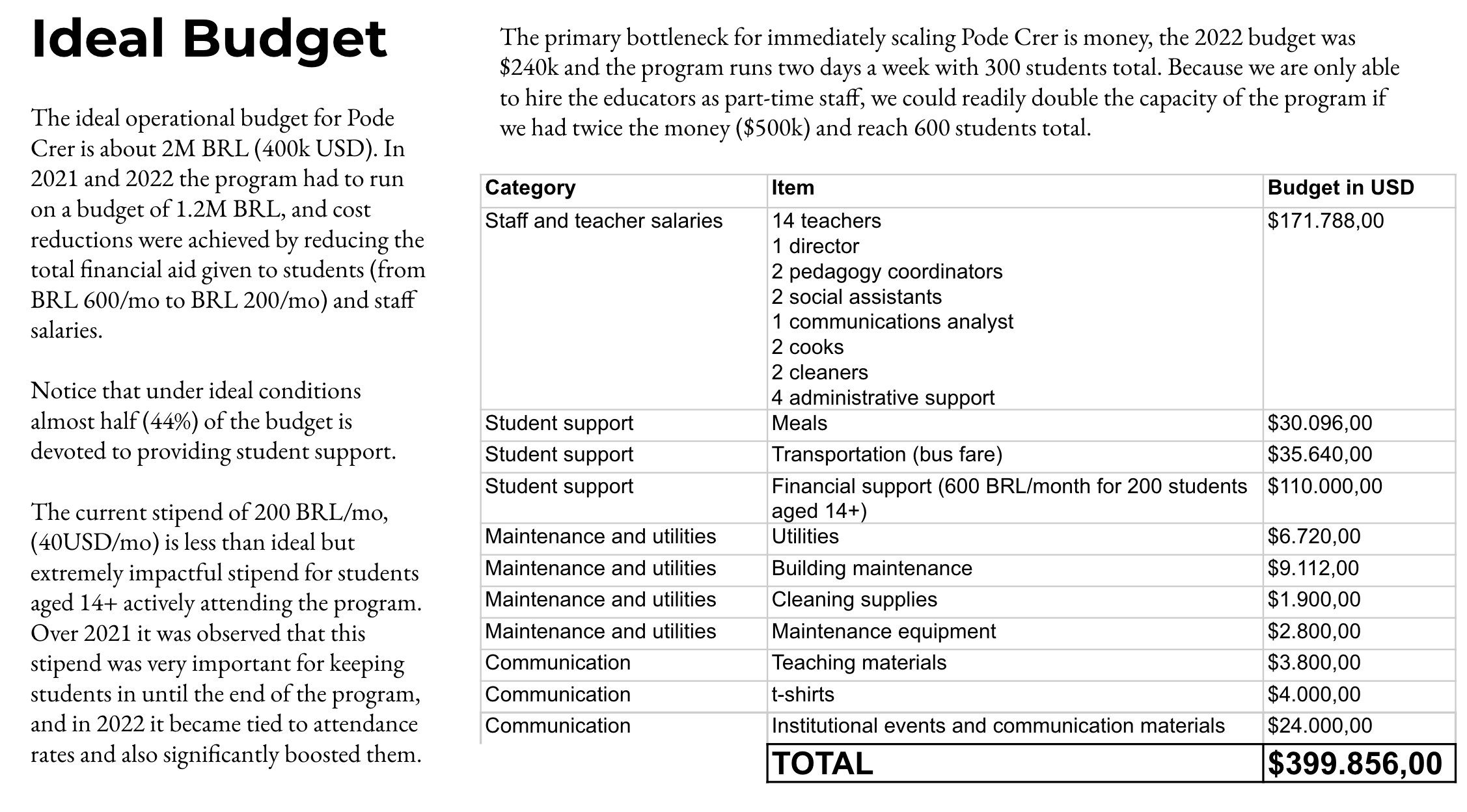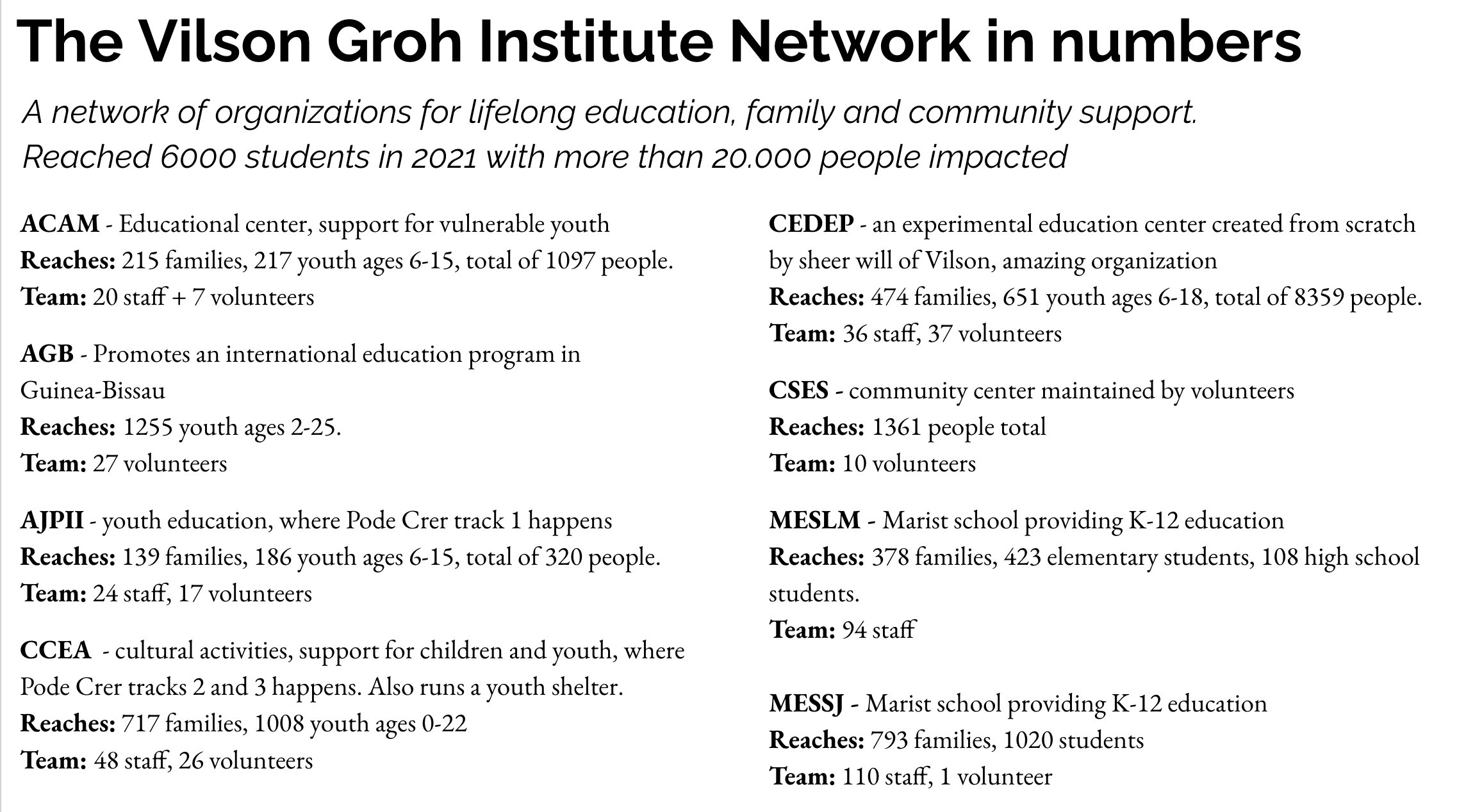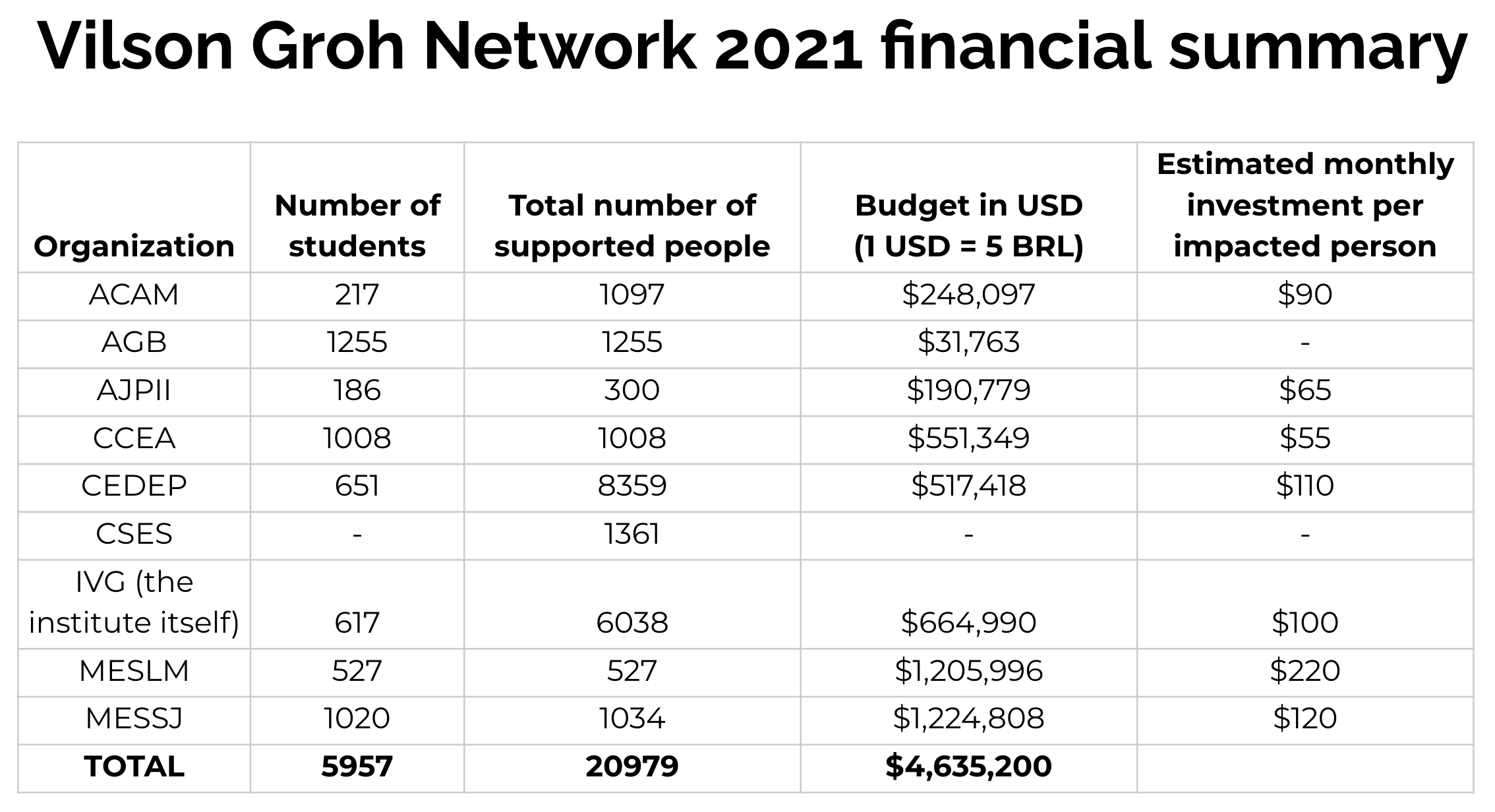vilsongroh.org
The Vilson Groh Institute in Brazil

Pode Crer: Technology, civics and leadership education for marginalized youth

- Pode Crer is a new educational program for marginalized youth created by the Vilson Groh Institute in Florianópolis in Brazil. Pode Crer provides youth ages 11-24 with complementary education focusing on on civics, technology, communication and expression, and socio-emotional skills
- Pode Crer aims to create an inclusive knowledge economy through opportunity, breaking the cycle of urban misery and violence
- Pode Crer was conceived to scale, and since 2021 has been running with 300 youth ages 11-24
- The growth plan is to create social innovation centers across 5 communities where the Vilson Groh Institute already operates to serve as Pode Crer hubs, and change each community from the inside out
- Pode Crer is free for students. We are fundraising to support continuing 2023 operations.
- One year of Pode Crer for 300 youth costs $240k USD. One social innovation center costs $1.2M USD
- Pode Crer is impactful. Of 200 youth aged 14+ in 2021, 66 went got jobs and internships after the program (37 in tech) and 7 went to university.
- These are vulnerable youth from violent and marginalized communities. This kind of impact life changing for these youth, who are prone to fall into violence, drug trafficking and underemployment.
- US tax deductible donations: you can use the designated fund we created together with the BrazilFoundation, an American 501(c)3: https://brazilfoundation.org/en/know-more/how-we-support/pode-crer-fund/
- Donations in Brazilian Reais: To make a donation in Brazilian reais you can use the Portuguese website donation page: https://www.redeivg.org.br/doe-agora/
- For English inquiries contact Tainara Lemos (Pode Crer lead) via email at tainara@redeivg.org.br or WhatsApp at +55 48 9133-5314.
Reports and presentations
The Detailed slide deck on Pode Crer
The 2022 Pode Crer report
Overview of all programs run by the Vilson Groh Institute
Vilson Groh Institute portuguese website: redeivg.org.br



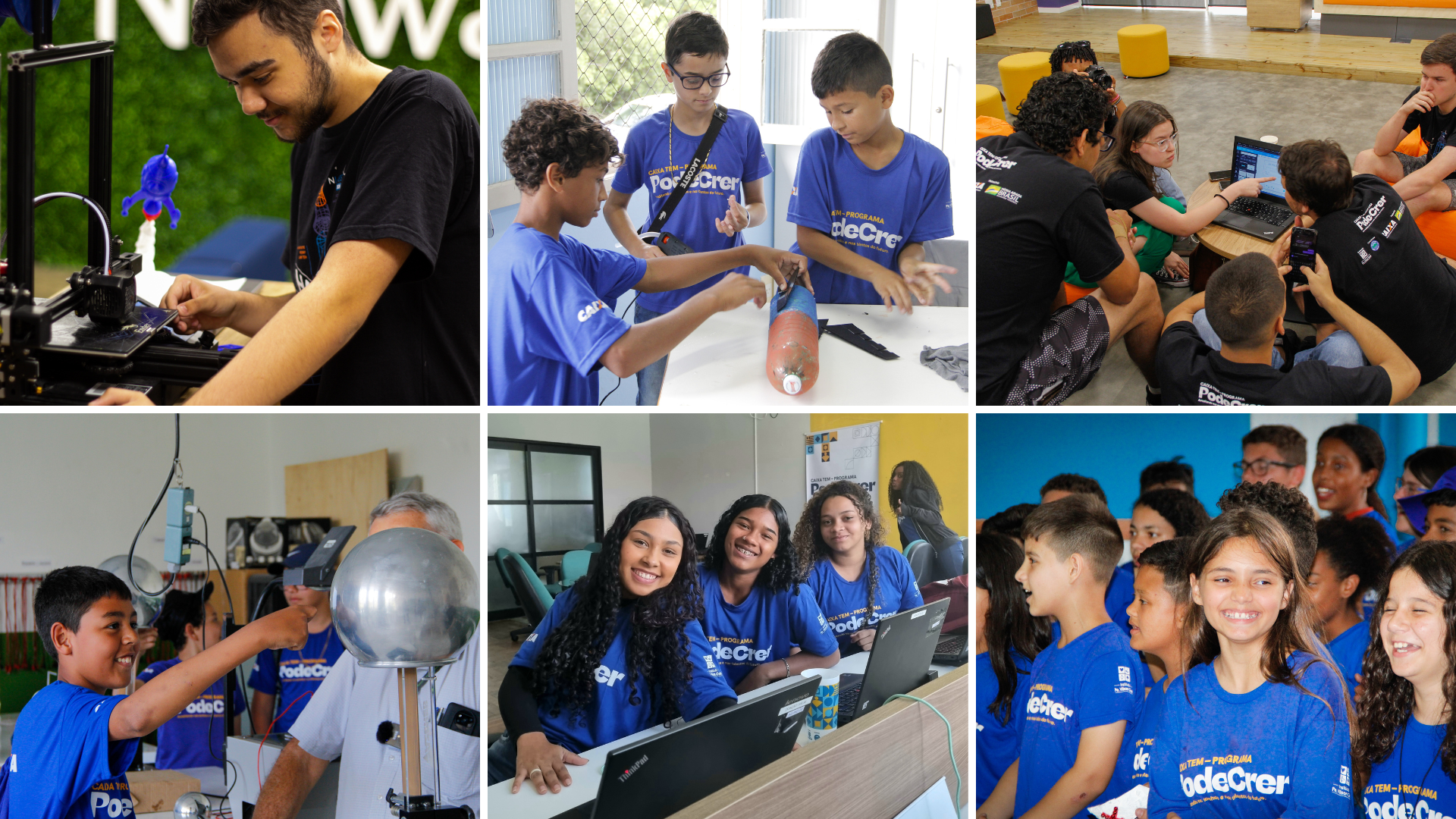
About the Vilson Groh Institute
The Vilson Groh Institute has a 40 year history transforming marginalized communities in Florianópolis, Brazil, with education and opportunity for social and economic integration. The Vilson Groh Institute official website (in Portuguese) is redeivg.org.br.
The Vilson Groh Institute is a Brazilian nonprofit that supports a network of 8 organizations built over 40 years of grassroots work in marginalized communities. Today this network reaches over 6000 students across their educational programs, and 20000 individuals across community and family support programs. The institute’s focus is on providing opportunity to at-risk youth, by supporting families, providing full time and part time educational programs, helping train and equip individuals for their first job, and providing scholarships for technical and university level education.
This network of 8 organizations was created largely due to a lifetime of work fostering dialogue and amassing tremendous goodwill across society from the Institute’s namesake: Vilson Groh. Forty years ago Vilson moved to the marginalized community of Monte Serrat in Florianópolis and devoted his life to enfranchising marginalized communities, using lifelong education and advocacy to bridge pervasive urban exclusion. This work continues today: now 68, living in the same place in Monte Serrat and still going strong, Vilson continues to use the respect, goodwill and convening power he earned over a lifetime of work dedicated to others to advance social and economic opportunity through innovative education and community programs.
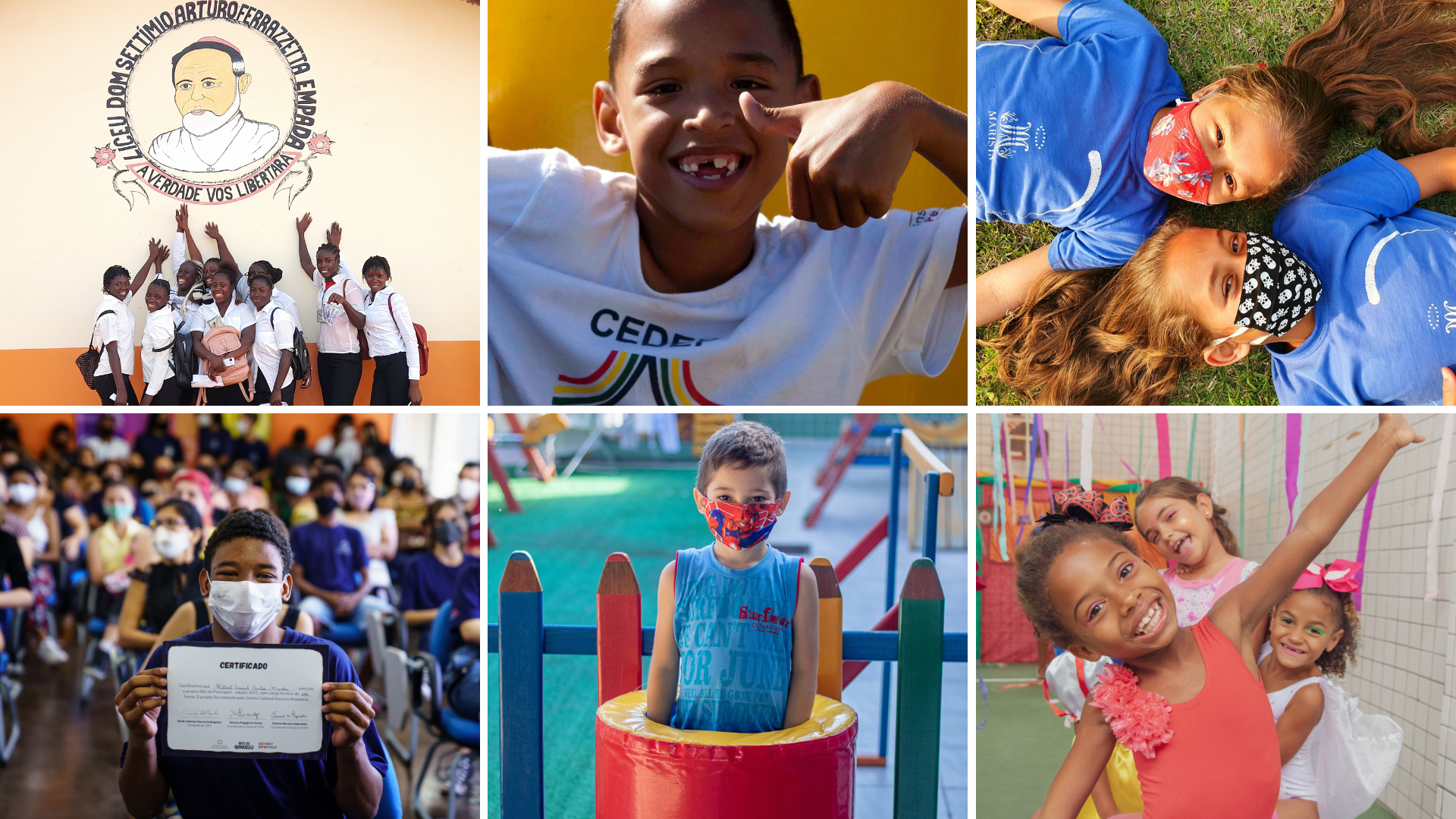


Impact over the last 10 years
Some results showing the impact of the Vilson Groh Institute results over the last 10 years:
- Over US$26 million invested in actions of prevention, insertion, coexistence, strengthening of bonds and education;
- Over US$400.000 transferred to organizations in the REDE IVG network;
- Over 7 million meals offered
- Over 1000 served by the Institute’s university preparation course and over 300 people started university after the preparation courses
- 4.866 people supported per year on average
- 2.105 young people enrolled under training and work programs
- 225 technical and higher education scholarships
- 2.219 families supported per year on average
- 288 volunteers per year on average
English media
- An article about the institute was published in October 2021 in the Harvard Review of Latin America
- A 4 min 2018 video with english subtitles about Vilson Groh, the man whose work resulted in the creation of the Vilson Groh Institute
- A 5 min 2021 video with English subtitles from a campaign to raise donations for individual scholarships to students in the Pode Crer program
Donations
Tax deductible donations in US Dollars
To make a tax deductible donation in USD with a credit card, you can use the designated fund we created together with the BrazilFoundation, an American 501(c)3:
Donations in Brazilian Reais
To make a donation in Brazilian reais you can use the Portuguese website donation page:
https://www.redeivg.org.br/doe-agora/
Donations via GitCoin
You can support the Vilson Groh Institute with donations using cryptocurrencies such as Ethereum in the Pode Crer GitCoin campaign page:
https://gitcoin.co/grants/7603/pode-crer-tech-education-for-marginalized-youth
The Pode Crer vision: Reinventing Education in Brazil
Pode Crer is a new complementary education program and methodology created to shape the future of Brazilian education and society. It aims to prepare students to be engaged leaders in society and active participants in the knowledge economy. Pode Crer implements a new educational approach and curriculum that blends technology, citizenship and communication. It is underpinned by the development of leadership skills in students, with great awareness of the challenging social context of Brazilian marginalized communities, where the program is implemented.
The Pode Crer program and methodology aims at nothing less than reinventing basic education in Brazil, and consequently the future of the country’s human development. The strategy is to begin this transformation through complementary education, where it is possible to innovate, iterate and be bold.
Pode Crer currently takes place in the city of Florianópolis, in the south of Brazil. Is divided into three educational tracks for ages 11-13, 14-17 and 18-24. The pilot program took place in 2021 with 320 young people in a hybrid format. In May 2022, its second iteration began, in a fully face-to-face format, with 300 young people, some of whom participated in 2021. Pode Crer is free and open for all.
The long-term vision of Pode Crer is to provide complementary education from birth to university age. To enable this vision and to serve as hubs for the implementation and growth of Pode Crer, five Social Innovation Centers will be created across the greater Florianópolis region in locations close to partner organizations. These centers will have state-of-the-art infrastructure to offer all the educational tracks of Pode Crer continuously. The first center is planned to open by 2025 in the community of Monte Serrat in Florianópolis, where Vilson Groh lives. It will have a maker space, computer labs, classrooms and workshops, auditorium, library, co-working spaces and large spaces for social coexistence.
Pode Crer is supported by the network that was built over 40 years of work by Vilson Groh and many other engaged individuals in marginalized and impoverished communities. The Institute and its partner organizations have a long history of success creating new educational programs serving marginalized communities and vulnerable populations in the most challenging situations in Brazil, in the midst of urban misery and violence. Because of this long experience and its institutional management capacity, the Vilson Groh Institute and its partner organizations are in a unique position to create, operationalize, and refine bold new educational initiatives for Brazil.

Current activities being developed as part of the Pode Crer program encompass: enrollment of youth aged 11-24; training courses developing hard and soft skills and focusing on technology, innovation, entrepreneurship, English as a second language, arts, communication and citizenship contents; strengthening their social, psychological and academic developments with scholarships, meals, support to their families and preparatory courses for universities and trade schools; bringing them closer to the innovation and technology ecosystem, and helping them enter universities and the job market.

Creating an inclusive knowledge economy and a society of leaders
While Pode Crer is currently implemented in three educational tracks for students aged 11 to 24 years old, the long term vision is to continuously guide students from one track to another, and to be expanded to offer complementary training from kindergarten to university.
The curriculum has three foundations: technology, citizenship, and communication. They were designed to prepare the student to actively participate in the knowledge economy, which demands skills that are not part of the Brazilian education system.
Beyond just technical skills, the fundamental element important is the ability to work well with people. Developing autonomy, communication and teamwork for working in a creative and dynamic environment demands emotional intelligence, awareness and self-confidence. These are elements that form the foundation of leadership, explicitly developed and improved by leaders and executives, but typically ignored in other contexts. Creating an inclusive knowledge economy that is not insular and elitist requires developing these elements in all individuals as part of the educational system. This means creating a society of leaders.
The full development of a knowledge economy also requires a society with functioning institutions and high levels of interpersonal trust. In Brazil these elements are still fraught and often absent. The country has institutions that are an important foundation but are still young and fragile. It is necessary to change Brazil’s pervasive culture of corruption. This culture manifests itself through a generalized mindset of trying to get ahead of others, usually by skirting the rules or disregarding what is public and common. It is necessary to inculcate civic mindedness into every Brazilian, and a genuine regard for everything that is common, shared and public.
When implemented on a national scale, Pode Crer will be paving the way in Brazil for the creation of a society of leaders with an inclusive knowledge economy - something that still does not truly exist anywhere in the world. The creation of an inclusive knowledge economy is the only sustainable way of closing the great social gaps in Brazil. In an economy where everyone actually participates, it is not necessary to permanently resort to assistance programs or income redistribution.
Plans for the Future: Social Innovation Centers
The institute’s grand project for the next few years is to shatter social segregation by building innovation centers across five marginalized communities in the Florianópolis region - to serve as a development model for the rest of Brazil. The projects and studies for the first center are done, and the estimated construction cost is 6 million brazilian reais, about 1.1 million US dollars. The project includes a library, maker lab, co-working space, classrooms and socialization spaces. It will be built in Mont Serrat - the community where Vilson Groh lives at - and completely reinvent the community’s image.

After Monte Serrat neighborhood the next two centers will be built in the Monte Cristo neighborhood in Florianópolis and at Ponte do Imaruim in Palhoça. The first is home to CEDEP (https://cedeponline.com.br), a popular and experimental education center that has 30 years of experience with complementary education. CEDEP carries out innovative educational experiments with vulnerable youth based on the philosophy of Brazilian educator Paulo Freire. The second location is home to the AJPII elementary school (https://ajp2.org.br/), where the Pode Crer track 1 pilot takes place (11 -13 years).
Current funding needs

We have the institutional capacity to operate and grow Pode Crer. We are bottlenecked by fundraising. The first center is planned to open in 2025 at a total cost of about $1M ($500k have been raised already). Future centers are estimated at $1M to build and operate for the first year. A center can serve 700 Pode Crer students and reaches about 5000 community members. Each center is planned to be staffed by 12 educators and 8 support staff. We are confident that if we have the money we can train and grow our team of educators by 50% each year.
Pode Crer is free and open to all, aiming to serve vulnerable students from marginalized communities. Students are divided into three educational tracks for different age groups. Ages 11-13 (track 1), 14-17 (track 2) and 18-24 (track 3). Students on tracks 2 and 3 receive an allowance of R$200 (USD 40) per month during the program. This allowance is fundamental to incentivize them and their families to focus on studies rather than procuring work to supplement family income.
Today Pode Crer is implemented as two weekly meetings in the morning or in the afternoon, in classes of up to 25 students who have classes and workshops on two topics a day. In the current two-day-a-week format, a team of 4 educators working full-time could serve 400 students on each educational track. To offer the program 5 days a week to 400 students, a team of 8 educators would be required. Currently, the two biggest limitations for the Program are financial resources to hire the entire team as full-time staff (many can only be paid part time), and physical space for the program’s activities. It is possible to double the reach of the program with the current team and twice the financial resources, with an yearly operating budget of R$2.4M (about 500k USD).
The story of Vilson Groh

Vilson Groh was born and raised in Brusque, a city founded by German immigrants in 1860 in the state of Santa Catarina. He came to Florianópolis in 1978 to pursue graduate studies at the Federal University of Santa Catarina (UFSC). Soon after Vilson moved to marginalized community of Monte Serrat in Florianópolis, which back then had no running water, sewage, paved roads, electricity or any kind of service. It was the quintessential favela, a Brazilian shantytown growing uphill without any kind of government oversight or regard, with rampant crime, violence and drug trafficking. Vilson devoted his life to enfranchising marginalized communities, using lifelong education and advocacy to bridge pervasive urban exclusion, and this work continues today. For decades Vilson lived like the poorest, in a wooden hut, like most people around him. For that to change it took his mother demanding that he live with a modicum of dignity when many around him had brick and mortar houses, she refused to visit him for a year. He finally upscaled into a humble two bedroom brick and mortar house built by the community in that spot, where Vilson continues to live today. Every day Vilson uses the respect, goodwill and convening power he earned over a lifetime of work dedicated to others to advance social justice through education, community and helping literally everyone in need.

The Vilson Groh Network
Through Vilson Groh’s leadership and that of many others, small projects have flourished and became reference organizations in communities. As time went on other organizations joined the movement, and the Vilson Groh Institute was founded in 2011, to strengthen the actions of these organizations already under the leadership of Vilson Groh.
It should be highlighted that all of this work is performed in violent and marginalized communities in an extremely challenging educational context: students are initially violent, aloof, brute, emotionally undeveloped, and often going hungry. This network approach only works because every educator, volunteer and supporter is sensible and deeply aware of the realities in each community, and the Institute is extremely good at training educators. The network works through a holistic approach and engage with everyone involved: students, parents, families and the community, meeting social reality, constantly reassessing it and adjusting our approach.
Today the organizations that compose the Vilson Groh Network are:
- CEDEP (Center for Popular Education) - an experimental community educational organization created from scratch based on Paulo Freire’s philosophy complementary education for 600 youth and continuing education for adults
- AJPII (John Paul II association) - a school for children an and adolescent education where track 1 of Pode Crer is executed
- MESLM (Marist School Lucia Mayvorne) - free full time education for about 500 children and adolescents
- MESSJ (Marist School São José) - free full time education for about 1000 children and adolescents
- CCEA (Slave Anastácia Cultural Center) - cultural activities, support for children and youth, and tracks 2 and 3 of the Pode Crer program
- ACAM (Mocotó Hill Children Friends Association) - youth education and shelter for children and adolescents in vulnerable families
- AGB (Friends of Guinea-Bissau) - runs bilateral education programs for elementary and high school, as well as teacher trainings in Guinea-Bissau
- IVG (The Vilson Groh Institute itself) - runs university preparation program, the Pode Crer program, multiple family and community support programs

Further detailed information about the impact of the institute is available in portuguese in thei Institute 2021 social impact report, in the Pode Crer 2021 report and in the institute’s social reports page
This webpage is maintained by Eduardo da Veiga Beltrame
